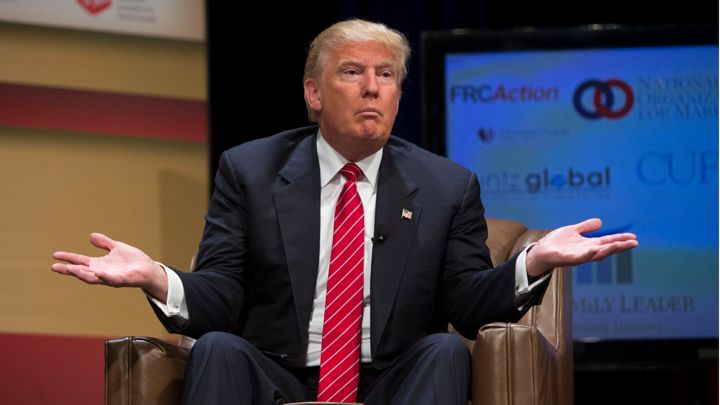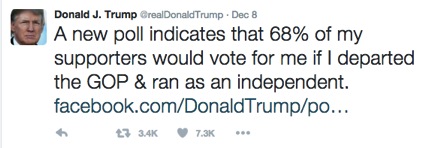
Last month, GOP candidate Donald Trump released a bold proposition calling for the United States to ban Muslims from entering the country. With cheers from faithful supporters in the crowd, he asserted, “Donald J. Trump is calling for a complete and total shutdown of Muslims entering the United States until our country’s representatives can figure out what the hell is going on.” This idea is in response to the mass shooting in San Bernardino, California.
Although Americans are used to hearing this type of talk from radio show hosts and Fox News anchors, for it to be voiced by the front-runner for the nomination of one of the two central political parties is astounding. What was once considered hate speech is now being proposed as a serious policy. Later, Trump exclaimed, “Probably not politically correct. But I don’t care.”
Many in the U.S. have affirmed that this proposal would violate the basic tenet of the U.S. constitution: the First Amendment’s doctrine of freedom of religion. Legal scholars have also asserted that Trump’s proposal would violate not only U.S. law, but would be considered illegal under international law.
Echoing this sentiment, White House press secretary John Earnest stated in a press conference the day after that every president must take an oath to “preserve, protect, and defend” the U.S. constitution, and thus, “what Donald Trump said yesterday disqualifies him from serving as president”. Earnest’s comments were celebrated, as the hashtag #TrumpIsDisqualfiedParty was trending on twitter.
Unfortunately, there is actually no statute or law that legally prevents him from continuing his campaign. Rather, his remarks should be more accurately deciphered as meaning that Trump is neither appropriate nor morally fit to be president.
Implications for the Republican Party
Later on, Earnest said, “The question now is about the rest of the Republican Party and whether or not they’re going to be dragged into the dustbin of history with him. And right now the current trajectory is not very good.”
While many party members have expressed outrage at Trump’s comments, there are some who support his line of thinking. One of Trump’s competitors for the nomination, Ben Carson, advised that Syrian refugees should be screened as though they are “rabid dogs”.
In addition, the Republican candidates have signed loyalty pledges avowing to support whoever wins the party’s nomination, be that Trump or any other candidate. Earnest declared that Republican Party members and supporters “should say right now that they will not support him for president”.
For the Republican Party to support such an outrageously vicious and senseless proposal would be tantamount to suicide. Although the GOP is known for its controversial stances on sensitive topics, this proposed policy would tarnish conservatism. Ultimately, what Trump is doing is handing the Democratic Party ammunition to categorize the Republican Party as hostile to minorities. What Trump and his backward strategies are doing is alienating the Republican Party from ethnic and religious minority groups—and this sort of alienation is one that will leave a permanent mark and affect all future elections. Regardless of Trump’s participation in future elections, people will subconsciously associate the GOP with bigotry and hatred.
Running as an Independent Candidate
Thankfully, the current situation is not in Trump’s favour as this proposal, unlike other previous offensive statements, has ignited unparalleled backlash from Republican members. After receiving scornful condemnations from prominent GOP leaders such as Mitt Romney and Dick Cheney and criticisms from fellow GOP presidential hopefuls like Jeb Bush, Trump is now threatening to run as an independent candidate. On December 8, he tweeted:
Running as an independent candidate is an incredibly difficult task that requires gaining ballot access in every single state. Although Trump has the funds and means to do so, states have multiple requirements and deadlines that make it very tough for even well-funded campaigners to get on the ballot in every state.
But it is doable. In the 1980 election, Congressman John Anderson left the Republican Party and began candidacy as an independent after getting on the ballot in all 50 states.
Although there does exist a precedent, it is highly unlikely that Trump will do so. Come spring, if Trump decides to go through as an independent candidate, he would have to spend hundreds of millions of dollars. Thus far, Trump has only spent $2 million out of his own pocket on his campaign; the rest, $4 million, has been donations from supporters. In addition, as he has said himself, he wants to run as a Republican because he thinks that he is more likely to win with the party.
